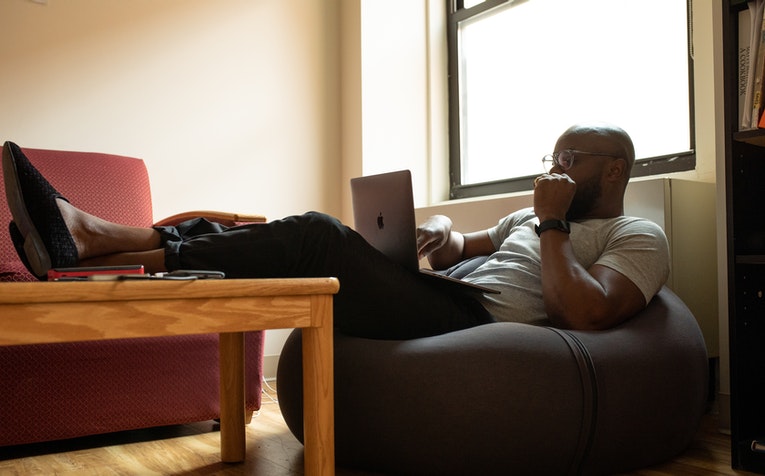You’ve stumbled upon this guide because you want to know how to become a digital nomad. Perfect! because you’ve come to the right place. I’m a digital nomad and have lived from my laptop in Thailand, Malaysia, Cambodia, and Vietnam. In this guide, I tell you everything I’ve learned and provide my unique insight into what it’s like living the digital nomad life.
Lately, there’s been a surge of people asking about how to make money online. So it’s only natural that the term “digital nomad” would crop up somewhere.
On top of that, with Covid and crazy lockdown measures, people are realizing the benefits of working remotely and not having to depend on one location to work.
Living the digital nomad life gives you the power to live anywhere while making money. It’s the ultimate lifestyle freedom.
However, it does come with its downfalls. Like all life choices, there are pros and cons to consider which we will talk about further in the guide.
Let’s first talk about what a digital nomad is and what you’re potentially getting yourself into…
Table of Contents
What is a Digital Nomad?
Basically, a digital nomad is someone who lives and works from their laptop. Because they work from their laptop and are completely online. They don’t need to be tied to one location to work. This means that they can travel and live anywhere in the world and support their lifestyle.
However, there is a catch to being able to live anywhere. Being able to live anywhere also depends on the income you can generate.
For example, a digital nomad making $2000 per month online couldn’t practically live in Singapore or other expensive European cities.
It just wouldn’t be feasible unless you make more money. That’s why a lot of nomads tend to live in cheaper countries such as Thailand, Columbia, or Mexico.
Essentially, being a digital nomad means having freedom of movement at all times.
Without getting into too many details too early. First, let’s move on to the first thing you need to consider before becoming a digital nomad.
How to Make Money as a Digital Nomad

This is the first step in becoming a digital nomad. You can’t be a digital nomad if you don’t have the funds to support yourself.
This section of the guide will discuss the different ways you can make money remotely and also touch on the pros and cons of different jobs.
Some of the most common ways digital nomads make money online are:
- Blogging
- Freelancing
- Start a business
- Web designers
- Marketing
- Consulting
- SEO
- YouTube
- Teaching Online
There are so many other jobs you can do remotely but they would probably take up too much of the guide.
Instead, I’m going to give you some insight into my experiences and the path I took when becoming a digital nomad.
Online Teaching
Online teaching is a great side hustle that you can do full time if you’re living in an affordable country. I work for three different teaching companies teaching English to children and adults.
Some of the popular ones include Cambly, iTalki, and Engoo. These are easy to work for and don’t require any degree or teaching certificate.
They tend to pay about $10 per hour which sounds terrible. However, if you’re living in a cheap country like Thailand or Vietnam that’s well more than you need to live a comfortable life.
Blogging
Blogging has one of the easiest entry levels of any job. Can you write in English and do you have a basic command of the English language? Perfect, you can be a blogger.
With blogging, your potential income is limitless. All it takes is finding your expertise and deciding on what value you can provide to the world. Once you have established that you can start a blog.
Not only is it very easy to start. It’s also very affordable. In my guide on how to start a blog. I explain the entire process in 5 easy to follow steps.
Web designer
I actually provide web design services through this website you’re on now. Essentially my blog became my web design business. A kind of all-in-one.
What I do is make websites for people through WordPress. So I don’t actually code or make my own websites.
This also has a very low barrier to entry because WordPress is very easy to learn. More importantly, it pays well! You can charge anything you want to make a website for someone.
I see people charging anywhere from $300 to $1500 for one website. If you’re interested in learning how to make websites. Check out my guide below.
Freelancing
Freelancing has become very popular especially in the last few years. There are many websites where you can advertise your services.
Some of the more popular ones include Fiverr, Upwork, and Freelancer. These platforms give you the opportunity to advertise your services for free.
You can basically advertise any services from graphic design to creative writing. Also, as a freelancer, you can set your own rate so how much you make is entirely up to you.
The three methods mentioned above are the three I’ve chosen myself and how I live a digital nomad life.
However, there are tonnes more ways that you can make money remotely. You just gotta use your imagination.
Research Location Expenses
After you have secured a way to make money online. The next step is to consider the location and the expenses involved.
For example, if you’re eager to get going as a digital nomad, starting in Paris may not be the best option. I use a great website called Numbeo to compare the cost of living in different cities.
For example, look at the difference in the cost of living when we compare Chiang Mai, Thailand to Paris, France.


Yes, you read that correctly! To maintain the same standard of living in Paris you need an extra 3 grand! Not 300 bucks but 3 with 3 zeros after it!
I assume now you can see the importance of considering the cost of living in different parts of the world.
This very factor will make or break your digital nomad journey.
Some of the most popular destinations for digital nomads are:
- Thailand
- Mexico
- Columbia
- Spain
- Vietnam
- Indonesia
Generally, they tend to be countries in the developing world because they’re much cheaper to live in.
Consider the Hurdles

Living in different countries is not as easy as just flying in and setting up camp anywhere you want. There are other factors to consider which may or may not limit your ability to live there.
Let’s have a look at the most important factors to consider as a nomad:
Visas
Living in different countries and traveling a lot will mean you’re going to be on a lot of different visas. Every time you land in a new country you’re going to be given a new visa.
Most countries will give US and EU citizens a 30-day visa exemption which means you can stay in the country for 30 days.
Also, some countries may require you to buy a visa before arriving in the country. I learned this the hard way on my last visit to Vietnam.
I made the mistake of not buying a visa before arriving and ended up having to pay $250 for a visa on arrival.
Pre-arrival visas are not required for all nationalities so make sure to check before just to be safe.
In some countries, you can avail of student visas. For example, in Thailand, you can study Thai for a few hours a day and get a 1-year visa to stay in the country.
It’s not a bad trade-off considering you get to live in the country and learn the language.
Many countries also let you extend your visa after 30 days for a fee.
Taxes & Company Registration
Having any source of income means that tax will be owed on it. Depending on where you are in the world, each country will have its own laws or rules on how tax is paid.
When you start to make a considerable income online you will need to pay tax. The best thing to do is to get in touch with a good accountant who can guide you on the best ways to handle taxes while living abroad.
It may be better to register as a sole proprietorship or as a limited company depending on your situation.
Banking as a nomad
Banking costs and fees are important things to consider when living abroad. I advise everyone starting out as a digital nomad to open a Wise account.
Not only is it cheaper than Paypal but its user interface and features are really handy when calculating costs and spending.
However, you should also have a PayPal account because some freelance clients may request it.
Besides Wise, I also use a Revolut account in case I end up in Europe. All my family members use Revolut so we can send money to each other in seconds. It comes in handy during an emergency.
Wifi
WiFi is your bread and butter as a digital nomad. You won’t get far making money online without a solid WiFi connection.
I suggest always keeping this in mind when moving into a new area or place. Make sure to always ask the owner or landlord about the WiFi connection speed.
Don’t feel awkward about asking this, the landlord or owner is well used to these questions. In fact, a lot of them will display this information in the advert.
Insurance
Travel insurance is a tricky one when living abroad because you’re not technically traveling when you’re living as a digital nomad.
But it’s important to consider that accidents can happen. And you don’t want to leave yourself in a bad situation in a foreign country.
Companies such as SafetyWing have insurance just for nomads. It usually starts at around $40 per month. It’s definitely something you should consider even for the peace of mind alone.
Transportation
Getting around the various cities and towns you’ll live in can be tricky at times. Most places will have great transportation services setup such as buses, taxis, and trains.
However, in countries such as Thailand, you can rent a scooter for about 60 bucks per month. I rent a bike myself in Thailand and it certainly saves me a lot compared to using public transport.
Besides renting scooters, simply renting a car tends to be a lot cheaper compared to western standards. In Thailand, you’re talking about $20 per day.
Accomadation
There are a lot of different websites you can use to find short-term accommodation. However, the two I found to be the best are Booking.com and Airbnb.
Booking.com also has a loyalty program for people that use the service regularly. They offer up to 15% off and even free breakfasts depending on how much you use the app.
Making Friends v Going Solo
When I first set off on my digital nomad journey I went alone. There’s a different feeling about being alone. It’s a different type of freedom and independence.
However, a lot of people I know experience loneliness after a while on the road.
It tends to be more prevalent when you’re living as a digital nomad because you don’t tend to settle too long. So friends come and go more often than usual.
I’m personally a very introverted person so I don’t tend to yearn for social interaction as much as my extroverted counterparts.
However, if you do catch those lonely blues there’s a lot of digital nomad communities to join. Some good places to find communities include:
- Facebook Groups
- Reddit threads
- Coworking spaces
To find Facebook and Reddit communities, simply search digital nomad communities into the search bar and lots of options should pop up.
To look for coworking spaces simply type “co-working spaces (your city)” into Google. Alternatively, after joining the Facebook or Reddit communities you can ask about the best ones to use.
Take the First Step

Now that you have the knowledge, it’s time to take the first step in becoming a digital nomad. The first steps should always start with some preparation.
Where to go?
Location, location, location… This is the biggest question you’ll ask yourself before taking that first step.
From my own experience, I would say Thailand. I absolutely love this country and the cost of living which we talked about above is nearly unbeatable.
The cost of living for rent and food is anywhere from $750 to $950 per month. That’s very doable, especially for a newbie nomad.
The great thing about Thailand is it’s close to a lot of other very affordable countries such as Cambodia, Vietnam, and Indonesia.
You could start your digital nomad journey hopping around South East Asia, sounds sick right?
Saving and Having an Emergency Fund
This part of the guide is probably where you should listen up. So just for a second, stop daydreaming about working from a beach in Columbia.
This section deals with money and being able to save it. More importantly, having an essential emergency fund in case things go wrong.
Trust me, you don’t want to be stuck in a sticky situation in a foreign country and realize you don’t have any money to get yourself out of it.
I recommend everyone to have at least $3000 as an emergency fund just in case.
In terms of saving, you will probably find that you can save much more compared to living in your home country.
Just make sure you’re saving at least 10-15% of your salary every month. You don’t want to arrive home after a few years of living off the grid with empty pockets.
You’ll be left sad and nobody will be impressed.
Embracing Minilism
So before you take off you have to consider a change in lifestyle. Especially a change in how you live and spend your money.
Firstly, you will have to decide to sell or leave behind your possessions. When I began my journey I was living at home with my parents so I didn’t have to sell anything.
However, many of you probably live in your own apartments and have other expenses such as cars and even debts.
I would suggest selling your car and ending any leases you may have on property. The whole point of a digital nomad is to have the freedom to move anywhere at any time. So financial burdens will only hold you back.
When you’re living as a nomad, it’s important to travel light and not fall into the trap of buying things you don’t need.
Summary
There you have it, that’s my two cents on becoming a digital nomad. That’s how I did it successfully and how I’m able to continue living abroad for half the price compared to Wester Living standards.
Here are the key points:
- Find a way to make money online – you cant do nothing without dough
- Research various locations for expenses – the cheaper the better
- First consider the hurdles – visas, taxes and loniless
- Take the first step – take an emergnecy fund and travel light
Now that you have the formula to becoming a digital nomad. What are you waiting for?
It’s time to take ACTION and follow your dreams, traveler!
If you have any more questions or concerns about this lifestyle, please reach out to me via my contact form and I will be happy to help you.
Best of luck.
Digital Nomad FAQ
How much does a digital nomad make?
How long is a piece of string? How much a digital nomad makes depends on the job they do. Research from Jey Jetter suggests that the entry-level income is about $20 per hour. 1 in 5 digital nomads said they make more than $100,000 per year.
Is it legal to live as a digital nomad?
Yes, it’s legal. There are no laws that say you cannot live in and travel frequently in different countries. However, many countries have visa restrictions which you will have to research before you go.
How much does it cost to be a digital nomad?
In terms of living expenses, most digital nomads live in cheap countries where the cost of living is about $900 per month on average. So per year, your expenses would be about $11,000 on average.
Where do digital nomads stay?
Anywhere and everywhere. Digital nomads often use services such as Airbnb and booking.com to book rooms for weeks or months at a time.
